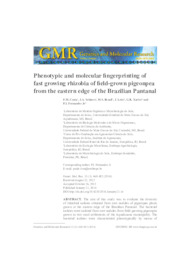Phenotypic and molecular finger printing of fast growing rhizobia of field-grown pigeonpea from the eastern edge of the Brazilian Pantanal.
Phenotypic and molecular finger printing of fast growing rhizobia of field-grown pigeonpea from the eastern edge of the Brazilian Pantanal.
Author(s): COSTA, F. M.; SCHIAVO, J. A.; BRASIL, M. S.; LEITE, J.; XAVIER, G. R.; FERNANDES JUNIOR, P. I.
Summary: The aim of this study was to evaluate the diversity of rhizobial isolates obtained from root nodules of pigeonpea plants grown at the eastern edge of the Brazilian Pantanal. The bacterial isolates were isolated from root nodules from field-growing pigeonpea grown in two rural settlements of the Aquidauana municipality. The bacterial isolates were characterized phenotypically by means of cultural characterization, intrinsic antibiotic resistance (IAR), salt and high incubation temperature tolerance, and amylolytic and cellulolytic activities. The molecular characterization of the bacterial isolates was carried out using amplified ribosomal DNA restriction analysis (ARDRA) and Box-polymerase chain reaction (PCR) techniques. In addition, the symbiotic performance of selected rhizobial isolates was evaluated in a greenhouse experiment using sterile substrate. The phenotypic characterization revealed that the bacterial strains obtained from pigeonpea root nodules presented characteristics that are uncommon among rhizobial isolates, indicating the presence of new species nodulating the pigeonpea plants in the Brazilian Pantanal. The molecular fingerprinting of these bacterial isolates also showed a highly diverse collection, with both techniques revealing less than 25% similarity among bacterial isolates. The evaluation of symbiotic performance also indicated the presence of microorganisms with high potential to increase the growth and nitrogen content at the shoots of pigeonpea plants. The results obtained in this study indicate the presence of a highly diversified rhizobial community nodulating the pigeonpea at the eastern edge of the Brazilian Pantanal.
Publication year: 2014
Types of publication: Journal article
Unit: Embrapa Semi-arid Region
Observation
Some of Embrapa's publications are published as ePub files. To read them, use or download one of the following free software options to your computer or mobile device. Android: Google Play Books; IOS: iBooks; Windows and Linux: Calibre.
Access other publications
Access the Agricultural Research Database (BDPA) to consult Embrapa's full library collection and records.
Visit Embrapa Bookstore to purchase books and other publications sold by Embrapa.

